About Virtual Fragility Forum 2020 Series
The Fragility Forum 2020 Seminar Series is a virtual and interactive series of events organized by the World Bank to share practical solutions and explore innovative ways of responding to the most challenging FCV issues of our times.
Join the conversation on Twitter using the hashtag
 #fragilityforum20
#fragilityforum20
As COVID reaches the world’s most fragile countries, knowledge of how it will impact conflict dynamics is critical. This knowledge will be essential for a host of stakeholders, from policymakers to humanitarian and development actors, for the design of effective policies and strategies to address this evolving challenge.
This webinar will feature a dynamic mix of global conflict experts, development specialists and country practitioners who will discuss what it takes to develop a real-time risk analysis framework to monitor the effects of COVID-19 on conflict.
A moderated discussion will ground this effort in the local context, with observations on the impact that COVID-19 is having on the conflict in Yemen and the Rohingya refugee crisis. The aim of the webinar is to share global knowledge about how to frame, obtain and utilize different sources of granular data to support conflict sensitive pandemic responses in real time.
View Keynote Presentation by Dr. David Kilcullen.
Got a minute? Take this very short survey about this event.
Keynote Presentation
 Dr. David Kilcullen
Dr. David Kilcullen
President and CEO, Cordillera Applications Group
David Kilcullen is a leading expert on guerrilla and unconventional warfare, and counterterrorism, with a 25-year career with the Australian and US governments as an Army officer, intelligence analyst and diplomat. He served in Iraq as counterinsurgency advisor to US General David Petraeus, as senior advisor to US Secretary of State Condoleezza Rice, and has served in Afghanistan, Pakistan, Somalia, Libya and Colombia. He is the author of five prize-winning books on terrorism, insurgency, urbanization and future warfare. Today, he advises world institutions, governments, businesses, NGOs and local communities across the globe, in working on complex humanitarian and security challenges, and is lead researcher for NATO’s ongoing Urbanization Program. Dr. Kilcullen is Professor of International and Political Studies at the University of New South Wales, Canberra, Professor of Practice at Arizona State University, and CEO of the research firm Cordillera Applications Group.
Speakers
 Wai Wai Nu
Wai Wai Nu
Founder and Executive Director, Women Peace Network
Wai Wai Nu leads Women Peace Network, a platform to build peace between Myanmar’s different ethnicities, and to empower and advocate for the rights of marginalized women across Myanmar and in Rakhine State in particular. A political prisoner for seven years under the Burmese military government, she was released 2012 under a presidential amnesty. Wai Wai Nu has since worked to reduce discrimination and hatred among Buddhist and Muslim communities in Myanmar and to improve the human rights situation of the Rohingya people, including through organizing peacebuilding activities and pro-bono legal consultation. Among other recognitions, she has received the Hillary Clinton Award (2018) and been listed among the Financial Times Women of the Year (2017). Wai Wai Nu holds a Master of Laws degree from the University of California, Berkeley.  Connect with Wai Wai
Connect with Wai Wai
 Ahmed Nagi
Ahmed Nagi
Nonresident Scholar, Carnegie Middle East Center, Carnegie Endowment for International Peace
Ahmed Nagi is a nonresident scholar at the Carnegie Middle East Center in Beirut, where his research centers on Yemen. Nagi is also research manager at the Institute of Citizenship and Diversity Management at Adyan Foundation, Lebanon, and a country coordinator on Yemen at Varieties of Democracy Institute (V-Dem), Sweden. Nagi holds a Master’s degree in public governance from the University of Granada, Spain. His research focuses on religious and tribal identities, citizenship, state building, civil society, conflict dynamics, and Yemen’s relations with its neighboring countries.  Connect with Ahmed
Connect with Ahmed
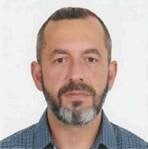 Spyros Demetriou
Spyros Demetriou
Senior Operations Officer, Fragility, Conflict, and Violence, The World Bank
Spyridon Demetriou joined the World Bank’s Fragility, Conflict and Violence Group in April 2020 as a Senior Operations officer, with a focus supporting its analytic and strategic work. Prior, Spyridon was a senior advisor to the World Bank on FCV issues, and worked in the FCV Group supporting country teams in the Middle East, West and Central Africa and Ukraine. Spyridon has also held senior management and advisory positions in the UN, leading peacebuilding, stabilization and post-conflict recovery initiatives and working at the forefront of international efforts to integrate peacebuilding, humanitarian and development interventions in a number of fragile and conflict-affected countries. These included Lebanon, where he headed the UN Coordination Office at the forefront of the Syrian refugee response; Democratic Republic of Congo, where he managed an integrated and multi-sectoral program bringing together UN peacekeeping, humanitarian and development assets to stabilize the conflict affected eastern regions; and Haiti, where he piloted approaches to reduce armed violence through development approaches in the urban slum areas of the capital. Spyridon has sectoral expertise in economic recovery, security sector reform and transitional governance, and an academic and research background in state-building and transitional governance, with a focus on processes of state formation and conflict in the former Soviet Union. He holds a BA in Economics and History from Brown University, and a Master’s Degree in International Studies from the Graduate Institute of International and Development Studies.  Connect with WBG Dev4Peace
Connect with WBG Dev4Peace
Chair
 Lauren Kelly
Lauren Kelly
Lead Evaluation Officer, Independent Evaluation Group, World Bank Group
Lauren Kelly oversees the thematic evaluations for the Sustainable Development and Infrastructure Global Practices of the World Bank. With over twenty years of international evaluation experience, Ms. Kelly has led multiple influential evaluations and managed several Board level engagements that have deepened development impact and contributed to evidence based decision and policy making within the World Bank Group. She is currently leading IEG’s evaluation of the World Bank’s Engagement in Situations of Conflict. With a background in conflict management, she has also made significant contributions in the field of natural resources and land use, worked extensively on pastoral and farmer relations in Africa, and helped to shape the One UN Policy with the United Nations Development Group (UNDG).
 Connect with Lauren,
Connect with Lauren,  Connect with IEG-World Bank
Connect with IEG-World Bank









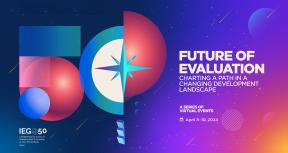
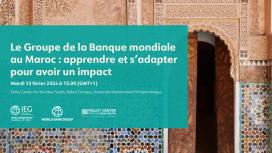
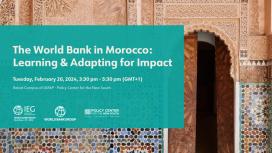



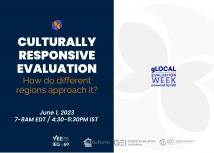
Comments
What would be impact of…
What would be impact of Covid 19 to achieve SDGs targets
I am a former WB STC, i…
I am a former WB STC, i live in Nicaragua and have no access to WB web streaming, would i be allowed to participate from my home or should i bother the home office in nicaragua to access the webinar. Please advise.
The live stream will be…
The live stream will be available to the general public, so you should have no problems accessing it.
How migration of workers can…
How migration of workers can be suitably handled during Covid? It is very important in every developing country.
Multinationals are at the…
Multinationals are at the forefront of mitigating some of the drawbacks of fragility because multinationals have the resources to rebuild their presence. How do you understand the prospect for a fragile nation to build back quickly and return to normalcy because of it's multinational corporations.
Q No. 1 Is there a viable…
Q No. 1 Is there a viable health model in any countries,West or East or East Asian or south Asian ,growth unarmed by covid-19 disaster ?, If so which of the measures will be effective in all these countries..A ) universal lockdown for a year or B) pump priming techniques of more cash &cash economy will arrest the upward trend, as people go out for livelihood, C)social distancing orD) finding a vaccine ..why all countries try only A,B,&C but not suggestion B ..which remedied 1929 World Depression...CAN World PRO KEYNESIAN?!!..your Reaction by prominent speakers,. Regards,Dr , Dr K Velmurugan Sivappraghassan Pondicherry S india
The world is divided,…
The world is divided, politics is at the hands of war lords. The UN is not working to resolve conflicts on the basis of cause identification. who is mandated to resolve conflicts world wide?- I thing the answer to the question can be the solution
Yemen and Rohinga, these are…
Yemen and Rohinga, these are world's most troubled situations. With Suadi Arabia in for owning Yemenis oil field backed by the US and Rohinga non-existent plan for self determination, there has to be hybrid solution rather than one-off solutions simply because the Suadis won't back down and the Hindus in Burma won't back down either. Foreigners have thrived in foreign land so as for citizenship in Burma, the government can only be coerced to accept foreigners to thrive. For Yemen, the best way out is to accept integration into Suadi plan of action just like we see between East and West Germany after all they are the same Arab people. The people of Suadi Arabia have accepted one family to rule them and they are prosperous, Yemenis can accept Suadi Arabia and simply forget about self determination because the Saudis won't back given their vast resources to keep the Yemenis down.
How quantitative multi…
How quantitative multi-hazard and risk assessment can be made by including Covid as a hazard including impact of climate change ?
Are there Africans in IEG's…
Are there Africans in IEG's Team?
Add new comment